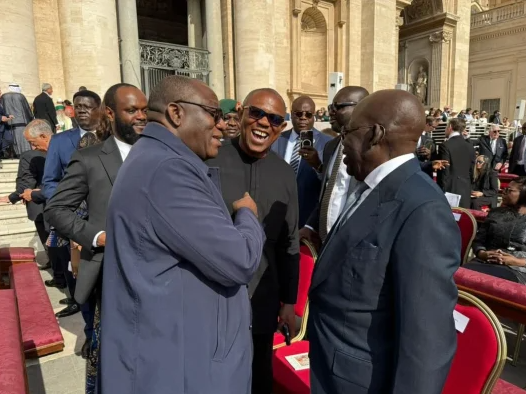INTERNATIONAL

TINUBU AND OBI SHARE LIGHT MOMENT AT POPE’S MASS IN ROME DESPITE POLITICAL DIFFERENCES
President Bola Tinubu and Labour Party leader Peter Obi were seen sharing a rare moment of levity during the inaugural Mass of Pope Leo XIV in Rome, offering a surprising break from their often tense political rivalry.
The two political figures, who faced off in Nigeria’s highly contested 2023 presidential election—with Tinubu of the All Progressives Congress declared winner and Obi finishing third—have long been at odds, with their supporters frequently clashing online and in person, reflecting deep political divisions in the country.
However, the tone in Rome was markedly different. Joined by former Ekiti State Governor Kayode Fayemi, Obi approached Tinubu upon spotting him at the Vatican ceremony.
“Mr. President, welcome to our church, and thank you for honouring the Pope with your presence,” Fayemi, a Catholic, remarked, according to the BBC.
Tinubu, a Muslim, replied with a touch of humor: “I should be the one welcoming you and Peter. I’m the head of the Nigerian delegation.”
Obi chuckled and responded, “Yes, indeed. We are members of your delegation.”
The moment, shared online by presidential aide Bayo Onanuga, sparked conversation about its symbolism in Nigeria’s tense political environment. Notably, Obi did not mention the encounter in his lengthy post about the Vatican trip on X.
Alkassim Hussain, a member of the House of Representatives, welcomed the development.
“They portrayed a good image of the country and that’s how politics should be played—without bitterness. I hope supporters of both Tinubu and Obi can see that after elections and court cases, it is all about the country,” the BBC quoted Hussain as saying.
Nigeria’s next general election is set for 2027, and speculation continues about a possible coalition between the Labour Party and the Peoples Democratic Party to unseat Tinubu, who is expected to run for a second term.
While elections in Nigeria have often been fraught with violence since the return to democracy in 1999, moments like this suggest a possibility of more mature political engagement.
"This represents a significant development in our ongoing coverage of current events."— Editorial Board









